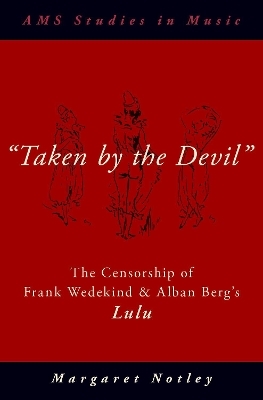
"Taken by the Devil"
Oxford University Press Inc (Verlag)
978-0-19-006986-5 (ISBN)
Censorship had an extraordinary impact on Alban Berg's operaLulu, composed by the Austrian during the politically tumultuous years spanning 1929 to 1935. Based on plays by Frank Wedekind that were repeatedly banned from being published and performed from1894 until the end of World War I, the libretto was in turn censored by Berg himself when he characterized it as a morality play after submitting it to authorities in Nazi Germany in 1934. After Berg died the next year, the third act was censored by his widow, Helene, and his former teacher, Arnold Schoenberg.
In "Taken by the Devil", author Margaret Notley uncovers the unusual and uniquely generative role of censorship throughout the lifecycle of Berg's great opera. Placing the opera and its source material in wider cultural contexts, Notley provides close readings of the opera's libretto and score to reveal techniques employed by the composer and by Wedekind before him in negotiating censorship. She also explores ways in which Berg chose to augment discrepancies between the plays rather than flatten them as in certain performances of the plays during the 1920s, adding further dimensions of interpretation to the work. Elegantly readable,"Taken by the Devil"is one of the most meticulously researched and nuanced studies of Lulu to date, and illuminates the process of politically-driven censorship of theater, music, and the arts during the tumultuous early twentieth century.
Margaret Notley is the author of Lateness and Brahms: Music and Culture in the Twilight of Viennese Liberalism, AMS Studies in Music (Oxford University Press, 2007) and the editor of Opera after 1900: An Anthology of Critical Essays (2010). Her scholarship has been supported by grants from the Fulbright Scholar Program, National Endowment for the Humanities, and American Philosophical Society, and her work has appeared in Journal of the American Musicological Society, 19th-Century Music, Journal of Musicology, and a number of multi-author volumes. For an article on late nineteenth-century adagios she received the American Musicological Society's Alfred Einstein Award in 2000. From 2001 to 2016, she was a member of the Editorial Board of Journal of Musicology, and she has been an Associate Editor of 19th-Century Music since 2006.
Preface
Chapter 1. Introduction
Chapter 2. "Burlesque Tragedy" and "Tristan Rapture": Fin-de-Siècle Decadence and the Lulu Works of Wedekind and Berg
Chapter 3. Lulu and/or Geschwitz Idealized, in the Symphonic Pieces and Elsewhere
Chapter 4. Berg's Literal-Mindedness and Second Order Consequences of Censoring Wedekind
Chapter 5. Act 1 of Lulu, Tragic Material Reconceived as a Comedy of Manners
Chapter 6. Act 2: Indirect and Second Order Consequences of Censorship on a Large Scale
Chapter 7. Quarantined Material: Husbands as Customers and Other Problems in Act 3
Conclusion
Bibliography
Index
| Erscheinungsdatum | 17.10.2019 |
|---|---|
| Reihe/Serie | AMS Studies in Music |
| Zusatzinfo | 40 illustrations; 14 photographs |
| Verlagsort | New York |
| Sprache | englisch |
| Maße | 239 x 155 mm |
| Gewicht | 612 g |
| Themenwelt | Kunst / Musik / Theater ► Musik ► Klassik / Oper / Musical |
| Kunst / Musik / Theater ► Musik ► Musiktheorie / Musiklehre | |
| ISBN-10 | 0-19-006986-4 / 0190069864 |
| ISBN-13 | 978-0-19-006986-5 / 9780190069865 |
| Zustand | Neuware |
| Informationen gemäß Produktsicherheitsverordnung (GPSR) | |
| Haben Sie eine Frage zum Produkt? |
aus dem Bereich


